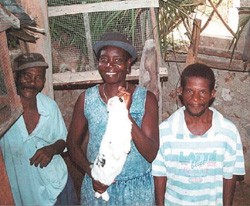
Rabbits are an important source of food and income in remote places like Cajun. They are easy to manage, require little space, breed prolifically, and are a good source of protein. The people of Cajun had attempted to raise rabbits before, but failed due to disease, parasites, and other problems they could not diagnose.
USAID’s Farmer to Farmer Program provides U.S. agribusiness volunteers on a short-term basis to assist farms, rural banks, processors, and growers’ associations in developing countries. The intent of the Farmer to Farmer program is to assist farmers in increasing food production and distribution by improving the effectiveness of farming and marketing operations in developing countries.
USAID helped Conservationiste D’ Haiti, with another farmer organization called Inite Peyisan Devlopman Gaya (IPDG), to implement Dr. McNitt’s recommendations. Within two months, the people of Cajun had collectively bought fourteen rabbits, and developed a plan to ensure that the fifty-eight participants received a breeding pair. Next, they developed a village-wide breeding, selling, and butchering strategy.
The success of the program has attracted additional funds for supplies and follow-up workshops on rabbit breeding in the village. This money was supplemented by funds donated from two other local villages which are preparing to raise rabbits themselves.
Based on their success, Conservationiste D’ Haiti and IPDG are planning to form a cooperative to buy materials in bulk and build less expensive cages together. When implemented, the cost of the cages will drop from $20 per cage to under $10 per cage. If successful, the co-op will expand to provide benefits to its members including vaccinations and other medications for farmers.







Comment
Make a general inquiry or suggest an improvement.